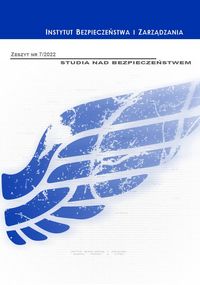Abstract
Contemporary political debate – public and individual – is undergoing progressive degradation, exemplified by the growing problem of hate speech, fake news and manipulation etc. The transfer of this debate to the web – further reinforced by the pandemic period – is resulting in the increased involvement of previously relatively passive citizens. The most serious current, though not de facto modern, problem affecting the state of domestic political culture is the disinformation and propaganda of the Russian Federation, especially that part of it directed directly against Poland and its society. Paradoxically, however, apart from the decidedly negative aspects of Russian propaganda, a phenomenon of political activism of Poles is observed. An area of this activism is the Internet, through which the process of strengthening the democratically desirable “participatory” model of political culture is taking place. The text is a reflection on the current state of political culture and its role in levelling the crisis of democracy.
References
Aro, J., Putin’s Trolls, Krakow 2020.
Dijk, van J., The Network Society, London 2012.
Dugin, A., The concept of network wars, [in:] “Geopolitics”, 2, 1(2), Częstochowa 2009.
Dugin, A., Essay on geopolitics. Russia’s geopolitical future, Moscow 1999.
Dugin, A., Postmodern geopolitics. Time of new empires, essays on geopolitics of the 21st century, Sankt-Petersburg 2007.
Głowiński, M., Jak nie dać się propagandzie, Warszawa 2016.
Gumilov, L., From Rus to Russia, Krakow 2004.
Jankowicz, N., How to Lose the Information War: Russia, Fake News, and the Future of Conflict, London 2020.
Krotoski, A., Virtual Revolution, Parts 1–4, BBC [documentary], London 2010.
Kupiecki, R., Chłoń T., Bryjka F., Platform for counteracting disinformation. Building social resilience research and education, Warsaw 2020.
Miloš, G., Mlejnková, P., Challenging Online Propaganda and Disinformation in the 21st Century, Cham (Switzerland) 2021.
Mouffe, Ch., The Paradox of Democracy, Wrocław 2005.
Pawlak, P., The nature of political discussion on news portals. A case study, [in:] ‘Studia Europaea Gnesnensia’, Poznań–Gniezno 2016, vol. 13.
Pawlak, P., Socializing political discussions using the example of the Internet: aggression and the search for compromise – a case study, [in:] “News of Irkutsk State University. Psychology Series”, Irkutsk 2014, no. 9.
Pawlak, P., War rhetoric in virtual space. Analysis of the content of the commentary layer of Polish news portals, [in:] “Wojna/pokój humanistyka wobec wyzwań współczesności”, R. Sapeńko, P. Pochyły (eds.), Zielona Góra 2017.
Radkiewicz, P., Authoritarianism and Ockham’s razor, Warsaw 2012.
Rosicki, R., Rosicki, G., Significance of the Nord Stream gas pipeline for Poland, [in:] “Internal Security Review” 2012, no. 4.
Siemieński, J., Kultura polityczna wieku XVI, Kraków 1932.
Stoppel, A., War in the net, or the other face of war in Ukraine, [in:] “Scientific and Methodical Review: Education for Security” 2021, no. 4 (53), Poznań 2022.
Trienin, D., Russia, Washington 2019.
Wolski, J., <https://twitter.com/wolski_jaros>.

This work is licensed under a Creative Commons Attribution 4.0 International License.
Copyright (c) 2023 Array

